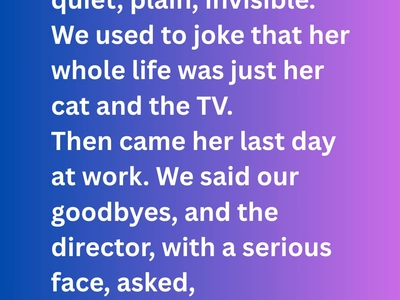The Quiet Hero Among Us
I was fresh out of college when I first walked into that office, still buzzing with the excitement of landing a real job. I had the confidence of someone who thought they understood how the world worked, and I was ready to climb the ladder as fast as possible. I shook hands, cracked jokes, joined lunch groups, stayed late to look good in front of the managers. Everything about me screamed energy and ambition. And then there was her—Ms. Ionescu—sitting at her corner desk like a shadow that no one really noticed.
She never joined our coffee breaks. She never laughed at the jokes that bounced around the office. She never even changed her sandwich. Day after day, beige clothes, a neat bun, a paperback book open beside her plastic lunchbox. She would look up if you passed her desk, nod politely, and return to her reading. That was all.
We turned her into a kind of office caricature. The woman with no stories, no adventures, no social life. “She probably just goes home, feeds her cat, and watches TV,” someone once whispered, and we all laughed. It was harmless, we thought. She never seemed to notice, never seemed to care. And since she never invited conversation, we gave her none. That was the silent rule: if someone didn’t want to talk, you let them be.
Years went by like this. Promotions, new hires, office dramas—people came and went, but she stayed the same. Unchanging, invisible. Until her final day.
It was her retirement. The company arranged the usual small farewell gathering in the break room. There was cake, a card filled with half-hearted signatures, and a gift bag with a mug and a pen set. We clapped politely as she walked in. She smiled, said a soft thank you, and began to edge toward the door. That’s when the director stopped her.
He looked at us, serious, almost grave. “Do you even know who she is?” he asked.
We laughed nervously. One guy muttered, “The cat lady?” A ripple of chuckles went through the room.
The director shook his head. “No. She is the reason this company exists.”
The room went silent. You could hear the humming of the fridge behind him.
He explained. Back in 2001, before any of us had joined, the company was collapsing. Payroll couldn’t be met, the owners were preparing to shut everything down, and everyone was about to lose their jobs. Then this quiet woman—this woman none of us had ever bothered to know—walked into the boardroom and offered her apartment as collateral. She mortgaged her home to keep the company alive.
“She didn’t ask for shares,” the director said, his voice heavy with respect. “She didn’t ask for recognition. She only said, ‘If we survive, pay me back slowly.’ And they did. It took ten years. Without her, none of you would even be here.”
I remember staring at her in disbelief. She stood there, head bowed, embarrassed by the attention. The woman I’d dismissed for years had been the one who saved the ground beneath my career.
It didn’t end there.
After she left, some of us, driven by guilt and curiosity, began searching her name. There wasn’t much. No social media, no interviews, no self-promotion. Just a trail of quiet kindness. Someone found a local newspaper clipping about an orphanage on the brink of closure. A photo showed her handing over a check, no interview, no speech. Just her name. Another article mentioned a scholarship she’d funded for high school students. Someone else discovered her connection to a community garden. A donation to an animal shelter. All anonymous, all silent.
I couldn’t get it out of my head. This woman had been right there in front of us, day after day, while we joked about her sandwiches and her beige sweaters. And she had been carrying more weight than any of us could imagine.
One day, I cornered the director and asked how he knew about the mortgage.
“I was there,” he said. “I was just an assistant manager, but I watched her walk into that boardroom like she owned the place. She looked at the owners and said, ‘Let’s do the math.’ And in that moment, I understood more about leadership than I ever learned in business school.”
That image stayed with me—her calm, steady presence in a room full of panic.
Two months later, I ran into her again at the library. She was sitting cross-legged in the children’s corner, reading a story aloud to a circle of kids. Same beige sweater, same quiet smile. When she saw me, she nodded.
“You’re from the office,” she said softly.
I sat beside her, awkward, unsure how to express what I felt. “I… I just wanted to thank you. For everything.”
She laughed gently. “Oh, I only pushed some numbers around.”
“No,” I said, “you saved us. You saved me.”
She shrugged. “It wasn’t about being known. You don’t water a plant by yelling at it. You just pour a little each day.”
That line carved itself into me.
I began to change. Slowly, but it happened. At work, I listened more. I reached out to the quiet interns. I invited the shy ones to lunch. I stopped bragging about my accomplishments. Instead, I focused on helping others succeed quietly, without needing applause.
Years later, when I became senior director, I stood in front of the team and told them about her. I told them that leadership doesn’t always roar. Sometimes it whispers. Sometimes it’s invisible. And sometimes, that’s when it’s strongest.
After my speech, a man approached me. He wore a worn coat, carried a small box, and introduced himself as her brother. He told me she had raised him after their parents died. She worked nights at a grocery store so he could go to school. He admitted he had made bad choices, drifted down dark paths, but she never stopped believing in him. She bailed him out, supported him, and pushed him to try again.
“She doesn’t need praise,” he said. “She just wants the people around her to be okay.”
Months later, word spread that she had passed away in her sleep. No big announcement, no long obituary. Just a small note in the local paper.
But those of us who knew her story refused to let her memory fade. We created the Ionescu Foundation, dedicated to honoring quiet helpers. People who, like her, worked in the shadows, making life better without asking for recognition. No speeches, no ceremonies. Just a letter and a heartfelt thank-you.
The first recipient was a janitor at a school who bought winter boots for kids who didn’t have any. We knew she would have smiled at that.
And yes, she was the cat lady. She did love her TV shows and her quiet afternoons. But she was also the woman who saved our jobs, who kept children fed, who lifted her brother from despair, who planted seeds of kindness everywhere she went.
I think about her every time I’m tempted to cut corners, every time I chase recognition instead of meaning. I think about that corner desk by the copier, where the quiet woman in beige taught me more about leadership than any mentor ever could.
Don’t underestimate the quiet ones. They are often the ones holding the world together. They don’t need the spotlight, but the spotlight would be empty without them.
If you feel invisible, remember this: invisibility doesn’t mean unimportant. The world needs its quiet heroes just as much as its loud ones. Maybe even more.
And if you know someone like that, tell them thank you. Even if they shrug, even if they act like it doesn’t matter. Because kindness should never vanish into silence. It deserves to echo.






